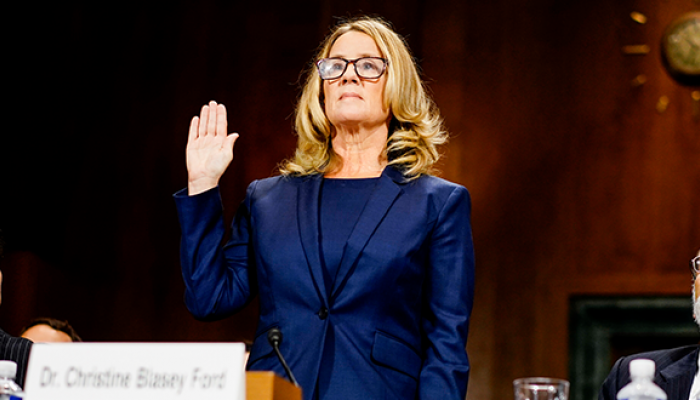When Dr. Christine Blasey Ford came forward with sexual assault allegations against Judge Brett Kavanaugh, one of the first questions to emerge from the judge’s defenders was: If she was sexually assaulted 36 years ago, why not report it then?
Probably for the same reasons that nearly 80 percent of rapes and sexual assaults go unreported, according to a Justice Department analysis of violent crime in 2016. The reality is, it’s very common for sexual assault survivors — most frequently, women — to decline to report the offense to police. At the same time, false accusations of rape or sexual assault are rare. And that should inform how we weigh Dr. Ford’s allegations, as well as those of other survivors.
It may sound incredible that only around 23 percent of survivors report such crimes to police, but it’s true. And that number is in line with past reports: Surveys of 2014 and 2015 both put reporting rates for rape and sexual assault in the low 30s. (A history of low reporting rates is one reason the Brennan Center declines to analyze trends in sexual assault in our crime reports. And low reporting rates don’t detract from the broader conclusions to those reports, that crime and violent crime remain historically low.)
Rape and sexual assault are serious offenses. So why aren’t they reported? Survivors cite several reasons. Twenty percent, according to the DOJ report, worry about retaliation — not just from the perpetrator, but from society at large. Thirteen percent said they think the police would not do anything to help. Tragically, 8 percent said they didn’t think the rape or sexual assault was important enough to report.
Sexual assault survivors struggle with a wide range of emotions that make coming forward difficult: fear of revictimization, distortion of allegations, and generally not being believed. As psychotherapist Beverly Engel puts it, “victims are often too ashamed to come forward. Sexual assault is a very humiliating and dehumanizing act against someone.” Why do victims often blame themselves? Engel continues: “[A]ttached to that shame is a lot of self-blame [. . .] because in our culture, we tend to blame victims in general.”
For all these reasons, unreported assaults are all too common. Far less common, however, are false accusations of sexual assault or rape, hovering between 2 and 10 percent in the United States. You wouldn’t know that from Kavanaugh’s defenders, including the president, who have insinuated that the judge’s accusers may be lying. But statistically speaking, it is far more common for a survivor of sexual assault to decline to report it than for someone to make false accusations of assault.
Given these statistics, we should be doing everything in our power to remove societal and structural barriers that can prevent survivors from coming forward. Questioning Dr. Ford’s motives, and asking why she didn’t come forward earlier — as many have done — both run directly counter to that goal. And they may further discourage survivors from coming forward with their stories, especially if the allegations are against those in positions of power.
The set of statistics surrounding sexual assault tell a clear story. Sexual assault is much more common than we think, while false accusations are much rarer than some of Judge Kavanaugh’s more partisan defenders have suggested. When we confront allegations of assault, in politics and in culture, we should understand the realities that sexual assault survivors face when speaking out about their experiences.




